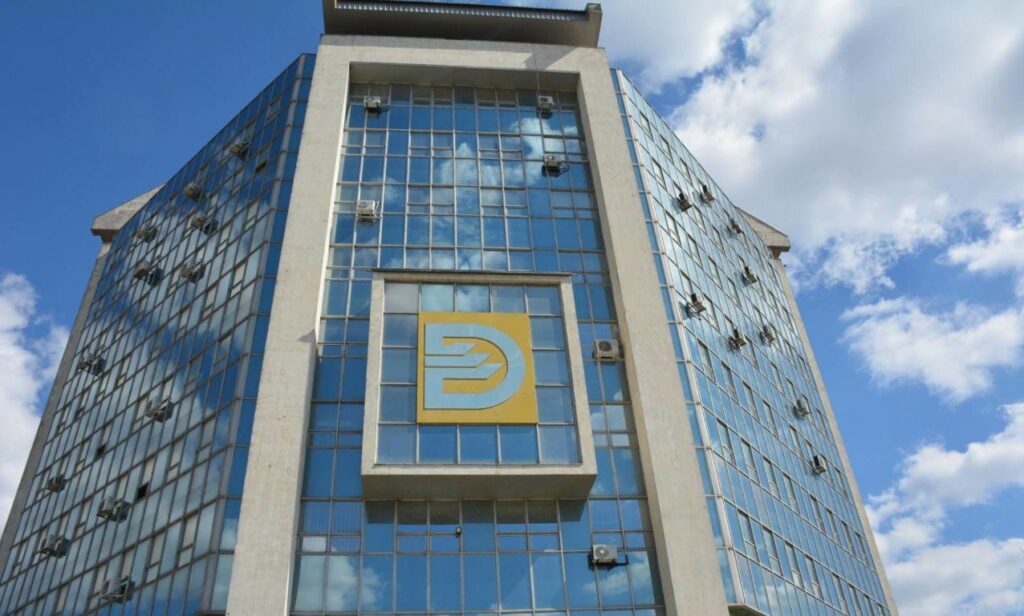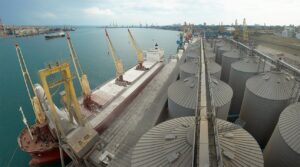Logistics companies and the stock market: investment prospects in Ukrainian business

For businesses, the stock market today is an opportunity to attract investments almost effortlessly, and for investors, to support the company and receive pleasant “bonuses” for it.
However, in Ukraine, the stock market remains a ghostly hope. We understand what benefits a business receives from a public offering, and whether Ukrainian logistics companies would become participants in the domestic stock market.

A little bit about stock markets
On the stock market, companies attract investment by selling small shares of their business. Investors can invest their funds in stocks or bonds of companies on the markets, and even make a profit. The state that runs the stock market also benefits by receiving investments for business development, innovation and job creation.
The largest stock markets in the world are the New York Stock Exchange (NYSE), NASDAQ, London Stock Exchange, Frankfurt Stock Exchange, etc. Among the European ones, the Warsaw Stock Exchange is also well-known, which actively attracts foreign companies, including Ukrainian ones. Thanks to liberal rules for participants, a convenient listing procedure and a stable economic system, the Warsaw Stock Exchange has become a regional investment hub for companies from Central and Eastern Europe.
You can invest abroad, in particular, in shipping companies. Almost all of them are global shipping giants:
Maersk (A.P. Moller – Maersk Group) is a Danish shipping company, one of the world’s largest in the container shipping sector. Its shares are traded on the Copenhagen Stock Exchange.
Mitsui O.S.K. Lines (MOL) is a large Japanese shipping company specializing in container, dry cargo and gas transportation. MOL shares are traded on the Tokyo Stock Exchange.
COSCO Shipping Holdings Co., Ltd. is a Chinese shipping company engaged in container transportation and is part of the state-owned China COSCO Shipping Corporation. Its shares are traded on the Hong Kong and Shanghai Stock Exchanges.
Diana Shipping Inc. is a Greek shipping company that provides dry cargo transportation services. Its shares are available for trading on the New York Stock Exchange (NYSE).
Frontline Ltd. is a Norwegian company that is one of the world’s largest operators of oil tankers. The company’s shares are traded on the New York Stock Exchange (NYSE) and the Oslo Stock Exchange.

What about stock markets in Ukraine?
In Ukraine, the stock market is still in its developing stage. As of 2024, several exchanges operate in Ukraine, the most active of which are the Ukrainian Stock Exchange and PFTS (First Stock Trading System).
However, Ukrainian companies are almost not traded on these exchanges, and trading volumes are relatively small. Among the reasons are the low level of market capitalization, insufficient liquidity, unstable macroeconomic situation and limited opportunities for attracting investments. If you have just learned about the existence of stock markets in Ukraine, this is precisely the result of the fact that the state is not sufficiently involved and interested in this process.
Moreover, Ukrainian exchanges do not have a developed infrastructure to attract large foreign investors. Most Ukrainian companies looking for external investments choose foreign markets, where liquidity and availability of capital are much higher.

Ukrainian business “abroad”
Many Ukrainian companies choose foreign stock exchanges for listing, where they can raise capital from a wide range of international investors. Here are some examples of Ukrainian companies that have listed their shares on foreign stock markets:
- Kernel is one of the leading agricultural companies in Ukraine, registered on the Warsaw Stock Exchange. The company is engaged in the production and export of sunflower oil, grains and other agricultural products.
- MHP (Myronivskyi Hliboproduct) is an agricultural company known as one of the largest producers of chicken in Ukraine, which also chose the Warsaw Stock Exchange for its listing.
- Ferrexpo is a mining company that produces iron ore pellets, which are exported to European markets. Its shares are traded on the London Stock Exchange.
- Agroton is an agro-industrial company listed on the Warsaw Stock Exchange, which is engaged in the production of grains and oilseeds.
- Naftogaz is a company engaged in the production and supply of gas. Its shares are not traded on stock markets, but it actively uses capital markets through the issuance of Eurobonds. For example, in previous years, Naftogaz issued bonds in euros and US dollars on international markets, in particular on the London Stock Exchange, which allows the company to raise funds for its projects and operations.
Shipping companies, such as Nibulon’s division, are currently not listed on exchanges, but are actively cooperating with international financial institutions, such as the EBRD and IFC, to secure financing for their projects.
Okay, Ukrainian business places shares not in Ukraine, but on exchanges abroad. But it is supported by foreign investors, the business continues to operate and develop, so is the lack of conditions for stock markets in Ukraine such a problem?
To explain, let’s give an example of the Warsaw Stock Exchange, already mentioned above. Not only business and its investors benefit from the placement of shares of a foreign company, but also the country that owns the stock market:
- Placing shares of foreign companies on the Warsaw Stock Exchange attracts capital from international investors. This increases the volume of trading and liquidity of the market, which makes Poland more attractive to investors from different countries.
- Strengthening the status of the Warsaw Stock Exchange: by attracting foreign companies, it becomes a regional financial center in Central and Eastern Europe. This significantly increases the reputation and influence of the exchange, making it competitive among other European exchanges, such as Frankfurt or London.
- Poland develops the local financial sector. After all, foreign companies that go public on the exchange interact with Polish banks, brokerage and law firms. This affects the development of financial infrastructure and job creation in the financial services industry.
- Of course, the growth of tax revenues. Each transaction on the exchange generates fees and tax revenues. Foreign companies pay commissions, registration fees and other mandatory payments that replenish the Polish state budget.
- Strengthening economic ties. When Ukrainian or other foreign companies are listed on the Warsaw Stock Exchange, this contributes to economic cooperation between countries, increasing the level of integration of the Polish economy into regional and global markets.
Thus, the entry of a Ukrainian company into the Polish stock market strengthens the role of the entire country as a financial center that is respected and trusted – and Ukraine would definitely not mind such an investment tool, especially in the context of the current and future reconstruction of the state after Russian aggression.
The Warsaw Stock Exchange building.

Why Ukrainian business should come back home?
However, not all Ukrainian public companies on foreign exchanges are satisfied with the listing. In 2023, Kernel CEO Andriy Verevskyi explained in a very lengthy letter to the Board of Directors what “disadvantages” the company has of being listed on the Warsaw Stock Exchange. The main thesis is the lack of benefits from the listing, since Kernel has not raised capital through the exchange for the past 11 years.
Verevskyi also noted that reforms in Poland, in particular the pension reform, have led to a decrease in interest from Polish shareholders – after the IPO, 80% of shares in free circulation were owned by Polish shareholders, in 2023 – less than 15% of shareholders were investors from Poland.
Also, according to Verevskyi, the exchange did not provide tools to improve the visibility of shares and liquidity, which reduced interest from analytical companies, which in turn led to a decrease in the liquidity of Kernel shares.
Verevsky’s original letter can be read at the link.
Of course, Ukraine currently has nothing to offer that could “cover” the same shortcomings of the Warsaw Stock Exchange that Verevsky highlighted in his letter. However, whether these problems would be relevant if our country had its own stock exchange is an open question.

Are Ukrainian companies dreaming of listing?
Of course, it would be easier and more profitable for Ukrainian logistics and agricultural companies to list on the stock markets in Ukraine if the listing conditions were on a par with foreign exchanges. Moreover, the demand for listing is there and it is very high.
For example, as USM was told by the Ukrainian Danube Shipping Company, many enterprises could list and become drivers of investment changes in Ukraine.
Thus, the UDS believes that if you have to choose between privatization and the company’s entry into the stock market, the second way is certainly more profitable for the state. The company’s shareholders can be, for example, cargo owners. The enterprise attracts investments and partners who guarantee a stable cargo base.
“At the same time, the state does not lose control over a strategic asset: Ukraine remains a national carrier on the Danube. From the very beginning, we and our international partners had exactly this vision of the company’s furtherdevelopment prospects,” the UDS press service noted.
The company noted that within the framework of cooperation with IFC (International Finance Corporation, — ed.) UDS carried out large-scale work, which made it possible to move towards opening a credit line with the subsequent possibility of entering the IPO. However, everything stopped at the stage of creating a supervisory board as one of the key tools of corporate governance. The shipping company emphasizes that without passing this stage, it makes no sense to discuss further steps.
As for the interest of potential investors in UDS shares, it will appear if an offer is formed.
“So far, we have to urgently resolve issues that have been in limbo in the ministry for six months. Finally, the situation has moved. But precious time has been lost. The further investment prospects of the company will depend on how quickly the situation is stabilized and breakeven is achieved,” UDS summarized.

Office of the Ukrainian Danube Shipping Company.
Is there a future for the Ukrainian stock market?
In our opinion, the successful models of the Warsaw or London Stock Exchanges can serve as a guideline for the development of the domestic stock market, which will allow the state to transform its market into an attractive platform for Ukrainian and international investors.
The entry of Ukrainian logistics companies into the stock markets within the country would have a number of important advantages both for the companies themselves and for the Ukrainian economy as a whole. Firstly, it would attract additional capital to expand and modernize production without the need to turn to foreign investors or take out loans on strict terms. Secondly, a public offering of shares would increase the transparency of companies’ activities, which would contribute to their reputation in the international arena.
In addition, thanks to listing on Ukrainian stock exchanges, the population would have the opportunity to positively influence the economy, stimulating domestic demand and contributing to the development of financial literacy. Thus, liquidity will increase in the Ukrainian market, the interest of foreign investors will increase, and the national economy will receive a boost to growth, which is absolutely necessary both during the war and during the post-war recovery period.
However, there are no prerequisites for creating a powerful stock market in Ukraine. Currently, the war is hindering the development of any economic initiatives, and there are no real steps by regulators that would indicate an improvement in the situation. Perhaps in the future, the government and regulators of Ukraine will be able to find a common solution that will lead to the emergence of a domestic stock market, but for now all this remains a phantom hope.





